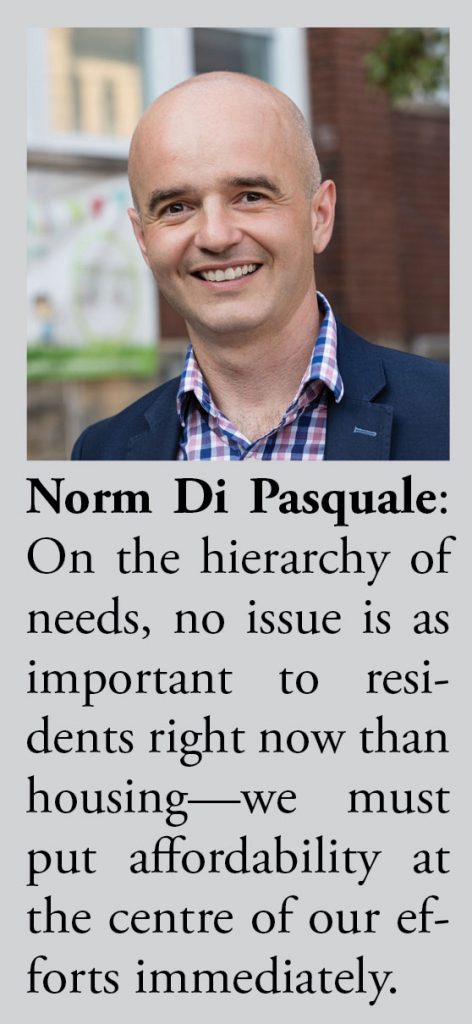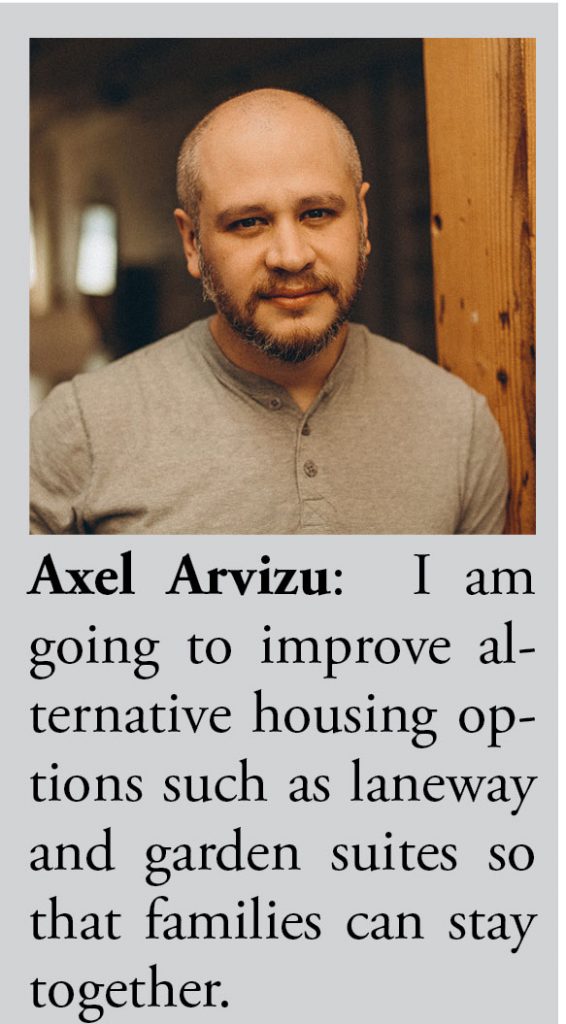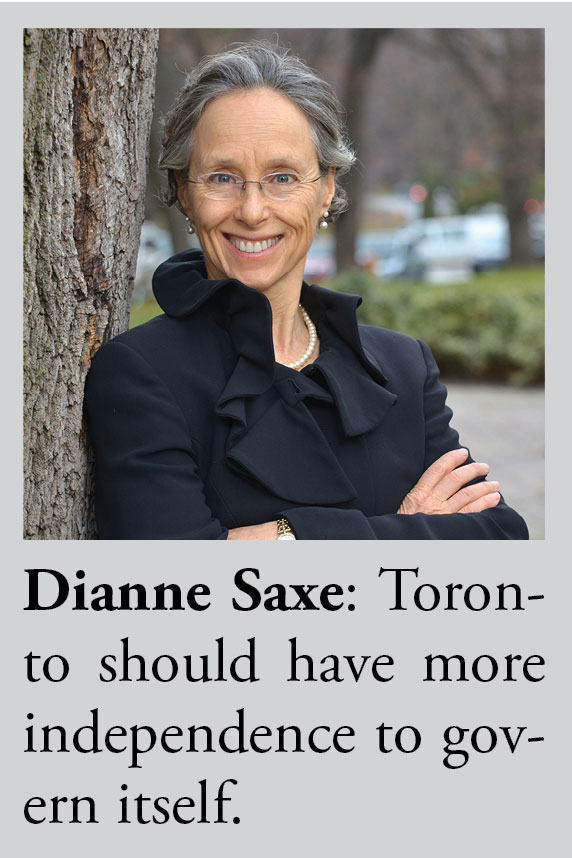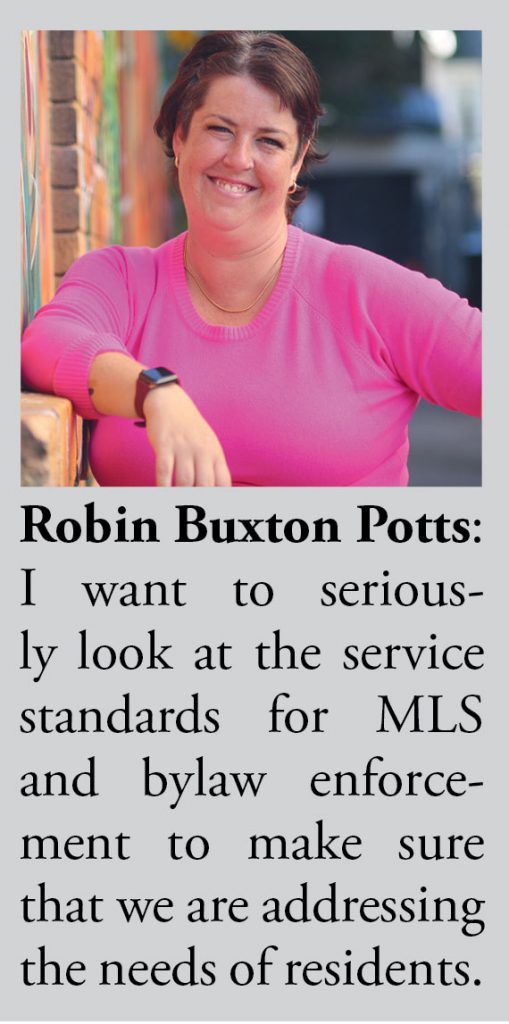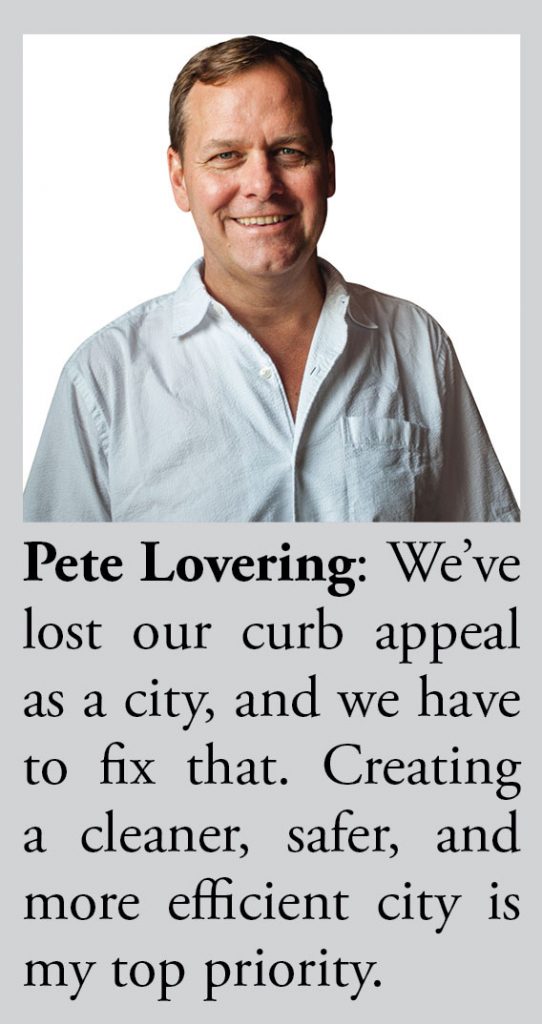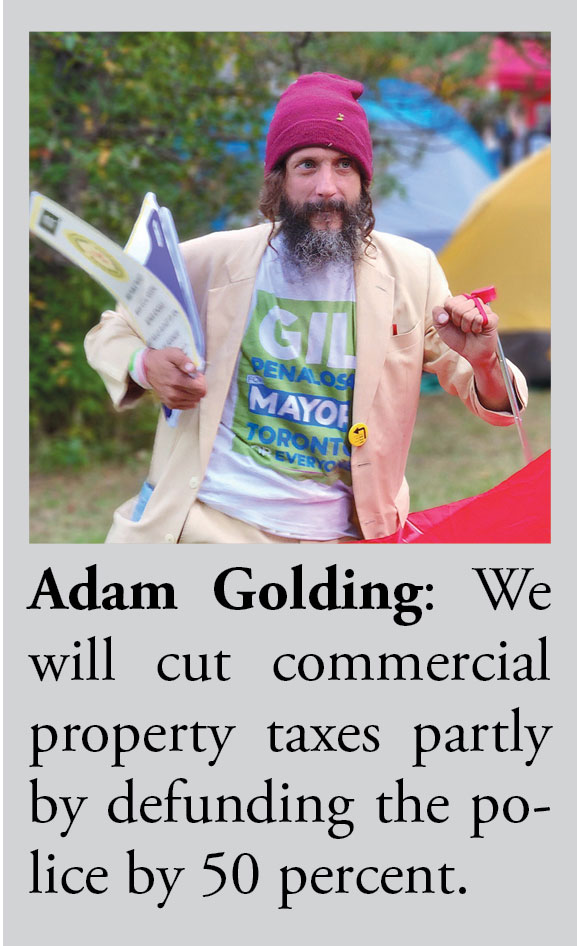The Gleaner gets answers from prospects for Ward 11 seat
Compiled by Brian Burchell
In every election, the Gleaner asks local candidates a series of relevant questions about where they stand to allow the reader, and presumably the voter, to comparison shop. These are their answers. The election is Oct. 24.
1. Do you support the “strong mayor” legislation that the province is enacting for Toronto?
Axel Arvizu – I believe that the current system in place provides a greater set of checks and balances for the mayor of Toronto.
While the strong mayor system has its benefits, like advancing time sensitive projects, it gives too much control over the city to a single person.
Essentially, the mayor could use his office to further his political agenda, ignore council members, and even veto any council decision.
Regardless of my position, we’ve learned that there is little the city can do about the province’s move towards a strong mayor system, and I hope that we as councillors learn to work together to keep the mayor in check and accountable to Torontonians.
Robin Buxton Potts – I agree with the assessment of our former city mayors. The “strong mayor” legislation eliminates any meaningful role of city councillors and therefore the voice of the local residents who elect them.
While I am confident that the current mayor, should he be re-elected, wouldn’t abuse this power, who knows about future mayors? The City of Toronto is already a creature of the province with them controlling much of what we do.
Tying the mayor more closely to provincial premiers means we will have even less control of our city, including when and where development happens.
Norm Di Pasquale – No. A better city is built through consultation and working together, not by any individual wielding authority over other elected officials.
The mayor already has substantial power on council through powers of appointments and the direct support of many city staff on day-to-day dealings.
The measures being proposed by the province are unnecessary.
Adam Golding – Absolutely not. The so-called “strong mayor” legislation turns the mayor into Ford’s B*tch.
They only need it because they fear a Tory defeat, either literally in terms of the mayor losing his seat or in the more practical sense of “Team Tory” losing members.
(Be sure to check the “Team Tory Percentages” calculated by Matt Elliot in “City Hall Watcher,” and check out my anti-Tory picks for council on twitter: https://twitter.com/adamgolding/status/1574818492158824449 #EvictJohnTory!!!!
Tory whips the vote today meaning he gets what he wants. He functions doing what people think a “strong mayor” would be capable of without the additional strings to the province.
We need the opposite. We need a diverse vote on council and independent thinkers who listen to everyone, not who vote as a bloc. The “strong mayor” legislation seeks to further codify the layers of COLLUSION we have in Toronto government including:
- collusion between councillors and the mayor (team Tory)
- collusion between council and media (via Tory’s job at Rogers!)
- collusion between council and police (via former police in the city manager’s office— fire Tracey Cook and do not vote for Jon Burnside).
- collusion between the city and the province (via strong mayor legislation)
END THE COLLUSION.
Peter Lovering – I will support every mayor with council members for the betterment of the city.
Toronto needs to get things done, especially when it comes to affordable housing, transit, and homelessness.
There is no better reflection of what the population wants—the mayor of Toronto. No matter what individual councillors want, they need to work together and with the mayor (whoever it is) to get things done.
If there is an issue with a mayor, we as the council, have the ability to veto.
We have to work together.
Dianne Saxe – The “strong mayor” legislation is now in force. This makes it even more important that Ward 11 elects someone like me who can work collegially and effectively with the mayor and the city’s full range of stakeholders. Our big problems require a big tent approach, now even more than before.
In my long career, I have worked for, and with, most city stakeholders. My expertise, character, and experience allow me to speak the language and understand the needs of stakeholders such as elected officials, public servants, businesses, and community groups. In turn, this allows me to find common ground and solutions by translating between different stakeholders.
Plus, I know Mayor Tory and believe I have earned his respect. We will be able to work together.
As great cities go, Toronto city government’s powers are weak. Toronto should have more independence to govern itself. It is harmful for the provincial government to impose unilateral changes like this, especially without notice or consultation; however, under Canadian constitutional law, cities are under the thumb of the province.
The fact is councillors have to work within the legal system the province creates. I am focussed on what city council and the mayor can do together within that system.
2. There are approximately 30 high-rise developments in the Gleaner’s coverage area, but similarly to other parts of the city, the supply of affordable housing is becoming increasingly scarce. How would your policy on housing and development impact this situation?
Axel Arvizu – Our generation is facing a housing crisis. We need to build inventory.
I am going to improve alternative housing options such as laneway and garden suites so that families can stay together and/or cool down the renters’ and sellers’ market conditions. I also plan to advocate and work with building departments to ease basement apartment conversions.
We need to take a close look and fix the backlog at the Landlord and Tenant Board. Investors and homeowners are scared to put their house or apartment in the market because they are afraid that they will have no recourse if they get a bad tenant. This goes both ways. Landlords and tenants should not have to wait more than a year to get a hearing.
I want to put a cap on rent increases, and resources to subsidized housing should be allocated to people who need it.
Robin Buxton Potts – Finding the balance between building a mix of new housing options quickly and affordably that doesn’t overwhelm existing neighbourhoods is critical to solving the housing crisis.
Super tall towers, often touted as a solution to the housing crisis, are incredibly disruptive to neighbourhoods and often displace residents and small businesses.
Rather than relying on a few affordable units in high rises, I would facilitate the ability for homeowners to create secondary units within their homes which would open access to thousands of empty bedrooms without having to add height and make it more affordable for people to stay in their homes.
We must ensure that these units are safe and well-made, but facilitating the construction of new units is an easy way to add new units to the city.
Laneway suites or backyard rentals are not sufficient to solve the problems alone. Allowing for safe, regulated multi-unit homes to be built or converted on existing properties is a great way to help homeowners stay in their homes and provides much-needed housing stock.
Norm Di Pasquale – City hall does not influence how quickly we receive development applications or the density and height being proposed.
This is largely driven by market forces. Applications we do receive need to have approvals completed more quickly, but we cannot ignore local voices when planning our neighbourhoods.
Many residents in the Annex and joining communities have strong processes through which development is reviewed. I think their insight and expertise is invaluable and present an opportunity to leverage their support and energy toward something positive. As with any political issue, I believe in building consensus and working together to find solutions.
I would guide this process toward a discussion on maximizing the affordable housing component, working to approve softer density and mid-rise proposals much more quickly, and directing more public investment into housing starts so we are not building condominiums that only a select few can afford.
These are just small pieces to address the housing crisis, and I encourage residents to learn more about my housing policies on my website.
Adam Golding – You can see the details at platform.adamgolding.ca, we propose a number of measures:
- Give Khaleel the key to the city. Name him a COVID hero.
- Aggressve vacancy taxes which double monthly.
- End vacancy decontrol (After Jessica Bell’s Rent Stabilization Act. This removes a perverse incentive to evict.)
- The beginning of a modest universal rent subsidy (indexed to Toronto rent prices, reducing the rate of evictions.
- Ban mass evictions and arbitrary relocations.
- Daily public meeting on houselessness and evictions.
- Limit rent control exemption on new developments to developments which do not replace functioning units — this provides a cash incentive to spread out as a city.
Peter Lovering – To solve our housing affordability issue we’re going to need a multipronged approach and collaboration across the city. Many of those ideas are also multi-governmental. There are several actions we can do now.
- Get the full inventory of Toronto Community Housing working at full capacity. Quickly repair and get needed housing units back into circulation.
- Accelerate and expand the Toronto Housing Now program designed to create mixed-income communities on public lands. Prioritize creative land use such as adding affordable housing above city libraries, arenas, subway stations and other underused city properties.
- Consider carefully curated additional density in our residential and heritage neighbourhoods such as garden and basement suites.
- Many seniors I talk to are scared. With inflation, taxes, and fixed incomes the city needs to provide permit fast-tracking for affordable secondary apartment rentals and even consider property tax rebates for those who qualify.
- Focus on sensible growth and partner with developers to include affordable housing. An “if you build this” then “you have to build that” approach.
- Having worked with many commercial owners over the years, there is an incredible opportunity for “micro-residential retail.” This needs to be explored and could very easily be subsidized through commercial tax incentives.
- Work with residents in Ward 11 to develop an “Invest in our Neighbourhoods Plan.”
Dianne Saxe – Hundreds of thousands of people are growing up in the GTA or moving here.
Since sprawl is the worst solution, we need to create good places for them to live, work, and play within existing urban boundaries, in a way that isn’t just for the rich. Young people, parents, nurses, and teachers have to be able to live well in our city without being priced out.
This won’t happen without a lot of new homes, both market and subsidized housing. I’ll work to create a larger, more varied supply of homes to moderate prices and increase affordable options and to improve the public amenities we all share.
I’d make it much easier to build low-rise neighbourhood-scale multi-unit housing by ending restrictive zoning. As Edmonton shows, this can unlock a rapid increase in “missing middle” homes to rent or own; for example, basement apartments, townhouses, garden suites, triplexes, walk-up apartments, and properly regulated rooming houses.
Provincial laws mean many mid and high-rise buildings will also be built. Ward 11 is such a great place to live that there are about 120 active proposals for such buildings. I’ll work to ensure they include various sizes of affordable units that are well designed, sustainable, and appropriately located (near arterial roads or transit hubs) and I will increase public amenities, such as ground-floor retail, wider sidewalks, schools, libraries, and parks.
I’ll support deeply affordable housing through inclusionary zoning, inexpensive use of public land, and density bonuses for permanently affordable nonprofit rentals.
3. In Toronto, the property tax burden is disproportionately borne by commercial taxpayers. Do you support raising the relative rate that homeowners pay to support the city’s budget?
Axel Arvizu – I agree that commercial taxes in Toronto are disproportionately borne many times, not by
landlords, but by small businesses trying to stay alive.
No one likes taxes, but these are necessary to pay for services the city needs. I do not want to see residents’ taxes go up, but I want to explore alternative ways to generate revenues such as increased fines, parking rates, parking permits, new condominiums, and imposing highway tolls on commuters from outside Toronto boundaries.
Robin Buxton Potts – Residential property taxes in Toronto have been at or below the rate of inflation for over a decade and we are seeing the outcome of that in services that do not meet our expectations.
Property tax assessments are based on the highest and best use, so properties, especially commercial properties near large developments, are seeing much higher assessments each year.
I would like to see a review of how MPAC assesses property taxes to help correct those increases, while also incorporating a larger mix of revenue tools that don’t rely solely on property taxes.
Norm Di Pasquale – The city is currently working toward making these payments between commercial and residential homeowners more equal with a freeze on commercial rates.
I will continue to support the freeze until the property tax burden can be shared. I will reject austerity budgeting and support increases to the residential mill rate.
Adam Golding – We will cut commercial property taxes partly by defunding the police by 50 percent. Residential property taxes will be frozen until the evictions crisis is over. Did you know homeless deaths have doubled since 2017?
Peter Lovering – The city needs to be accountable, sensible, and transparent. We must prioritize accountable financial management, balanced budgets, and sensible taxes, all the while monitoring our financial resource allocation, so we continue to maintain and enhance the quality and diversity of our city services. I would like to find as many efficiencies as possible before we consider raising taxes.
Dianne Saxe – Yes. A vibrant city needs neighbourhoods such as thriving local retail which should not be choked off by an unfair tax burden on top of the pandemic. But when we ask residents to pay more, they also must get more. The fundamental contract between government and the community is that government must reliably meet people’s basic needs and that taxes have to be commensurate with services.
That’s not what’s happening. People tell me they see Toronto services and infrastructure in decline. Parks are shabby, sidewalks are littered with trash, water fountains are broken, and so many are homeless. This breaks the social contract.
Services and infrastructure that work are essential to a good quality of city life and cannot be provided without adequate revenue. Toronto residential property taxes are much lower than those of nearby municipalities and are too low to keep the city in good repair. To have a city that works, city revenue will have to rise, coupled with careful programs to protect low-income Torontonians.
Importantly, the city should not be relying so heavily on property taxes and should take the advice of the former city manager to pursue other types of revenue such as a land transfer tax, vehicle registration tax, and highway tolls.
4. What is your favourite Annex green space and why?
Axel Arvizu – Even though it’s small, my favourite green space is St Alban’s Square. I walk Blu, my husky dog, very early in the mornings, and going to St. Alban’s Square is always a great start to our day.
Robin Buxton Potts – I was honoured to be at the name unveiling for Paul Martel Park and it remains one of my favourite places in the city.
The new mural is such a welcome surprise and adds so much life to the space. I love the park because of the involvement of community members in its maintenance and restoration and the focus on preserving the ecological history.
Paul Richard is such a wealth of knowledge, and his passion for the park and his work to restore it are everything I love about neighbourhoods like the Annex.
Norm Di Pasquale – The city recently refinished Joseph Burr Tyrrell Park and I have to say that I am a huge fan.
I know it is not the biggest space, but I saw the condition of the playground before and what Councillor Layton and residents were able to transform this into is inspiring. The park still smells of fresh cedar, over a year later.
The park speaks to what is possible in all of our public spaces if we can dedicate ourselves to solid design, safety, and inclusivity.
This need not apply to parks and green spaces alone. We can challenge the status quo on our roads, sidewalks, and other public spaces and make them greener, and more importantly, safer.
This park speaks to the opportunity we have to transform Ward 11, and I look forward to applying the lessons we can learn in other areas of the city.
Adam Golding – Sibelius Park. I love it! I remember the day I discovered the new rope structure with my friends as we walked out from a party I was hosting at Tartu College, in my student days, across the street from the former Rochdale where my mom had lived.
I’m showing films about Rochdale this Tuesday, 3-6 p.m. at Film Cafe in Kensington!
Peter Lovering – I would have to say Taddle Creek Park. It’s actually pretty cool because it is named after the underground river that went from St. Clair all the way down to the Distillery.
Philosopher’s Walk is part of the Taddle Creek Ravine. It is also located on the spot of Sir Frederick Banting’s house.
The park itself has a great playground, and the art is visually interesting because it represents the buried river. Worth a visit!
Dianne Saxe – Jean Sibelius Park. I particularly like the community-made skating rink that gets built there in the winter (when the weather cooperates) and the annual corn roast. They are inspiring examples of neighbours coming together and building on the foundation of public infrastructure to support joy and an enhanced sense of community.
The park has a great playground that my grandchildren love to get sandy and muddy in. There are shared toys. The public bathroom has a shade and rain cover and provides a critical public service.
The Bike Share station makes the park a useful node in our public transport network. The shady trees, benches, and tables make it a gathering place for people of all ages. I’ve been to family birthday parties and community gatherings in Jean Sibelius Park over the years and look forward to attending many more.
5. If you are elected, what issue or policy will you address first? What’s at the top of your personal
agenda?
Axel Arvizu – The top of my personal agenda is wanting to see Ward 11 as a place where we can raise our children and have a sense of community and safety and make Toronto a brighter city. This begins by addressing the affordability, mental health, and drug crises.
Robin Buxton Potts – Fixing a washroom or removing garbage and graffiti might not be the flashiest part of the city government but these are the nuts-and-bolts issues that I am most eager to focus on. These are small things that really help build pride in a neighbourhood and a city.
I want to seriously look at the service standards for MLS and bylaw enforcement to make sure that we are addressing the needs of residents while we tackle the big systemic challenges around housing, transit, and climate.
Norm Di Pasquale – It is difficult for me to pick one issue or policy when we are faced by so many issues at city hall.
Failing public services, meaningful action on climate change, and the state of our parks and washrooms are all important issues.
However, on the hierarchy of needs, no issue is as important to residents right now than housing. From supportive housing for those currently experiencing homelessness and choosing encampments, to the lack of new units to keep up with a growing population, we must put affordability at the centre of our efforts immediately.
We cannot allow our most vulnerable and marginalized residents to live without safe, stable, and supportive housing.
We saw how quickly we could mobilize during the pandemic to provide housing for those in need, and we can do it again.
Homelessness is a policy choice we do not have to accept.
Adam Golding – Basic needs. One of the wealthiest cities in the world should be able to address everyone’s basic needs before we waste any more cash.
Please join me in turning us into a “Maslow’s Hierarchy” city. #EvictJohnTory (Please learn the song and look up the #EvictJohnTory playlist on youtube [https://www.youtube.com/playlist?list=PL_-Kd_WSmEAEX2DbvZPb3y2vSRygtJO-v] which documents the moral crime of the mass evictions last year in which hundreds were assaulted, charged, ticketed, injured, or otherwise violated at Tory’s behest.
To be clear, this was the chain of command: Cops, Burnside, Cook, Tory. They all have to because they and their authoritarian ilk divert money from basic needs to their control freak fantasies.
Peter Lovering – We’ve lost our curb appeal as a city, and we have to fix that. Creating a cleaner, safer, and more efficient city is my top priority.
It starts with listening to residents and ensuring our core city services such as parks, waste, bylaw enforcement, safety, and transportation are held accountable to you the resident.
Dianne Saxe – 1. To provide more low-rise and affordable housing by working with the mayor and council to legalize missing-middle housing and rooming houses.
2. To cut deaths and injuries on the roads by implementing Vision Zero and putting people before cars on dangerous streets such as Avenue Road.
3. To bring back good maintenance of public space and infrastructure.
4. And to do it all with a realistic climate lens so that we limit catastrophic damage and become more resilient to our changing future.
There are 14 candidates on the ballot for Ward 11 University—Rosedale. The Gleaner reached out to each candidate for whom contact information was available. The following individuals either did not supply contact information or did not respond in time for publication: Michael Borrelli, David Fielder, Andrew Layman, Alison Pang, Ann Rohmer, Heather Shon, Pierre Therrien, and Diana Yoon.
READ MORE ON THE PREVIOUS ELECTION:
- FOCUS: Putting candidates to the Gleaner test (City Election 2018)
- FORUM: Take back Toronto on the 22nd (City Election 2018)
- FOCUS: Should the public and Catholic boards be amalgamated? (City Election 2018)
- FOCUS: TCDSB candidate queries remain largely unanswered (City Election 2018)

